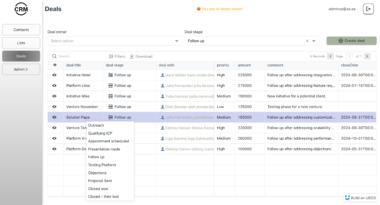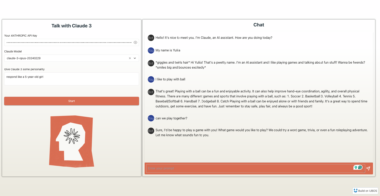WebDAV MCP Server
A Model Context Protocol (MCP) server that enables CRUD operations on a WebDAV endpoint with basic authentication. This server enables Claude Desktop and other MCP clients to interact with WebDAV file systems through natural language commands.
Features
- Connect to any WebDAV server with optional authentication
- Perform CRUD operations on files and directories
- Expose file operations as MCP resources and tools
- Run via stdio transport (for Claude Desktop integration) or HTTP/SSE transport
- Secure access with optional basic authentication
- Support for bcrypt-encrypted passwords for MCP server authentication (WebDAV passwords must be plain text due to protocol limitations)
- Connection pooling for better performance with WebDAV servers
- Configuration validation using Zod
- Structured logging for better troubleshooting
Prerequisites
- Node.js 18 or later
- npm or yarn
- WebDAV server (for actual file operations)
Installation
Option 1: Install from npm package
# Global installation
npm install -g webdav-mcp-server
# Or with npx
npx webdav-mcp-server
Option 2: Clone and build from source
# Clone repository
git clone https://github.com/yourusername/webdav-mcp-server.git
cd webdav-mcp-server
# Install dependencies
npm install
# Build the application
npm run build
Option 3: Docker
# Build the Docker image
docker build -t webdav-mcp-server .
# Run the container without authentication
docker run -p 3000:3000
-e WEBDAV_ROOT_URL=http://your-webdav-server
-e WEBDAV_ROOT_PATH=/webdav
webdav-mcp-server
# Run the container with authentication for both WebDAV and MCP server
docker run -p 3000:3000
-e WEBDAV_ROOT_URL=http://your-webdav-server
-e WEBDAV_ROOT_PATH=/webdav
-e WEBDAV_AUTH_ENABLED=true
-e WEBDAV_USERNAME=admin
-e WEBDAV_PASSWORD=password
-e AUTH_ENABLED=true
-e AUTH_USERNAME=user
-e AUTH_PASSWORD=pass
webdav-mcp-server
Configuration
Create a .env file in the root directory with the following variables:
# WebDAV configuration
WEBDAV_ROOT_URL=http://localhost:4080
WEBDAV_ROOT_PATH=/webdav
# WebDAV authentication (optional)
WEBDAV_AUTH_ENABLED=true
WEBDAV_USERNAME=admin
# WebDAV password must be plain text (required when auth enabled)
# The WebDAV protocol requires sending the actual password to the server
WEBDAV_PASSWORD=password
# Server configuration (for HTTP mode)
SERVER_PORT=3000
# Authentication configuration for MCP server (optional)
AUTH_ENABLED=true
AUTH_USERNAME=user
AUTH_PASSWORD=pass
AUTH_REALM=MCP WebDAV Server
# Auth password for MCP server can be a bcrypt hash (unlike WebDAV passwords)
# AUTH_PASSWORD={bcrypt}$2y$10$CyLKnUwn9fqqKQFEbxpZFuE9mzWR/x8t6TE7.CgAN0oT8I/5jKJBy
Encrypted Passwords for MCP Server Authentication
For enhanced security of the MCP server (not WebDAV connections), you can use bcrypt-encrypted passwords instead of storing them in plain text:
Generate a bcrypt hash:
# Using the built-in utility npm run generate-hash -- yourpassword # Or with npx npx webdav-mcp-generate-hash yourpasswordAdd the hash to your .env file with the {bcrypt} prefix:
AUTH_PASSWORD={bcrypt}$2y$10$CyLKnUwn9fqqKQFEbxpZFuE9mzWR/x8t6TE7.CgAN0oT8I/5jKJBy
This way, your MCP server password is stored securely. Note that WebDAV passwords must always be in plain text due to protocol requirements.
Usage
Running with stdio transport
This mode is ideal for direct integration with Claude Desktop.
# If installed globally
webdav-mcp-server
# If using npx
npx webdav-mcp-server
# If built from source
node dist/index.js
Running with HTTP/SSE transport
This mode enables the server to be accessed over HTTP with Server-Sent Events for real-time communication.
# If installed globally
webdav-mcp-server --http
# If using npx
npx webdav-mcp-server --http
# If built from source
node dist/index.js --http
Quick Start with Docker Compose
The easiest way to get started with both the WebDAV server and the MCP server is to use Docker Compose:
# Start both WebDAV and MCP servers
cd docker
docker-compose up -d
# This will start:
# - hacdias/webdav server on port 4080 (username: admin, password: admin)
# - MCP server on port 3000 (username: user, password: pass)
This setup uses hacdias/webdav, a simple and standalone WebDAV server written in Go. The configuration for the WebDAV server is stored in webdav_config.yml, which you can modify to adjust permissions, add users, or change other settings.
The WebDAV server stores all files in a Docker volume called webdav_data, which persists across container restarts.
WebDAV Server Configuration
The webdav_config.yml file configures the hacdias/webdav server used in the Docker Compose setup. Here’s what you can customize:
# Server address and port
address: 0.0.0.0
port: 6060
# Root data directory
directory: /data
# Enable/disable CORS
cors:
enabled: true
# Additional CORS settings...
# Default permissions (C=Create, R=Read, U=Update, D=Delete)
permissions: CRUD
# User definitions
users:
- username: admin
password: admin # Plain text password
permissions: CRUD # Full permissions
- username: reader
password: reader
permissions: R # Read-only permissions
# You can also use bcrypt-encrypted passwords
- username: secure
password: "{bcrypt}$2y$10$zEP6oofmXFeHaeMfBNLnP.DO8m.H.Mwhd24/TOX2MWLxAExXi4qgi"
For more advanced configuration options, refer to the hacdias/webdav documentation.
Testing
To run the tests:
npm test
Integrating with Claude Desktop
- Ensure the MCP feature is enabled in Claude Desktop
Using npx
2. Open Claude Desktop settings and click edit config (`claude_desktop_config.json`) 3. Add ```json { "mcpServers": { "webdav": { "command": "npx", "args": [ "-y", "webdav-mcp-server" ], "env": { "WEBDAV_ROOT_URL": "Using node and local build
2. Clone this repository and run `setup.sh` on mac/linux or `setup.bat` on windows 3. Open Claude Desktop settings and click edit config (`claude_desktop_config.json`) 4. Add ```json { "mcpServers": { "webdav": { "command": "node", "args": [ "Available MCP Resources
webdav://{path}/list- List files in a directorywebdav://{path}/content- Get file contentwebdav://{path}/info- Get file or directory information
Available MCP Tools
webdav_create_remote_file- Create a new file on a remote WebDAV serverwebdav_get_remote_file- Retrieve content from a file stored on a remote WebDAV serverwebdav_update_remote_file- Update an existing file on a remote WebDAV serverwebdav_delete_remote_item- Delete a file or directory from a remote WebDAV serverwebdav_create_remote_directory- Create a new directory on a remote WebDAV serverwebdav_move_remote_item- Move or rename a file/directory on a remote WebDAV serverwebdav_copy_remote_item- Copy a file/directory to a new location on a remote WebDAV serverwebdav_list_remote_directory- List files and directories on a remote WebDAV server
Available MCP Prompts
webdav_create_remote_file- Prompt to create a new file on a remote WebDAV serverwebdav_get_remote_file- Prompt to retrieve content from a remote WebDAV filewebdav_update_remote_file- Prompt to update a file on a remote WebDAV serverwebdav_delete_remote_item- Prompt to delete a file/directory from a remote WebDAV serverwebdav_list_remote_directory- Prompt to list directory contents on a remote WebDAV serverwebdav_create_remote_directory- Prompt to create a directory on a remote WebDAV serverwebdav_move_remote_item- Prompt to move/rename a file/directory on a remote WebDAV serverwebdav_copy_remote_item- Prompt to copy a file/directory on a remote WebDAV server
Example Queries in Claude
Here are some example queries you can use in Claude Desktop once the WebDAV MCP server is connected:
- “List files on my remote WebDAV server”
- “Create a new text file called notes.txt on my remote WebDAV server with the following content: Hello World”
- “Get the content of document.txt from my remote WebDAV server”
- “Update config.json on my remote WebDAV server with this new configuration”
- “Create a directory called projects on my remote WebDAV server”
- “Copy report.docx to a backup location on my remote WebDAV server”
- “Move the file old_name.txt to new_name.txt on my remote WebDAV server”
- “Delete temp.txt from my remote WebDAV server”
Programmatic Usage
You can also use this package programmatically in your own projects:
import { startWebDAVServer } from 'webdav-mcp-server';
// For stdio transport without authentication
await startWebDAVServer({
webdavConfig: {
rootUrl: 'http://your-webdav-server',
rootPath: '/webdav',
authEnabled: false
},
useHttp: false
});
// For stdio transport with WebDAV authentication (password must be plain text)
await startWebDAVServer({
webdavConfig: {
rootUrl: 'http://your-webdav-server',
rootPath: '/webdav',
authEnabled: true,
username: 'admin',
password: 'password'
},
useHttp: false
});
// With bcrypt hash for MCP server password (HTTP auth only)
await startWebDAVServer({
webdavConfig: {
rootUrl: 'http://your-webdav-server',
rootPath: '/webdav',
authEnabled: true,
username: 'admin',
password: 'password' // WebDAV password must be plain text
},
useHttp: true,
httpConfig: {
port: 3000,
auth: {
enabled: true,
username: 'user',
password: '{bcrypt}$2y$10$CyLKnUwn9fqqKQFEbxpZFuE9mzWR/x8t6TE7.CgAN0oT8I/5jKJBy'
}
}
});
// For HTTP transport with MCP authentication
await startWebDAVServer({
webdavConfig: {
rootUrl: 'http://your-webdav-server',
rootPath: '/webdav',
authEnabled: true,
username: 'admin',
password: 'password'
},
useHttp: true,
httpConfig: {
port: 3000,
auth: {
enabled: true,
username: 'user',
password: 'pass',
realm: 'MCP WebDAV Server'
}
}
});
// For HTTP transport without authentication
await startWebDAVServer({
webdavConfig: {
rootUrl: 'http://your-webdav-server',
rootPath: '/webdav',
authEnabled: false
},
useHttp: true,
httpConfig: {
port: 3000,
auth: {
enabled: false
}
}
});
License
MIT
WebDAV MCP Server
Project Details
- LaubPlusCo/mcp-webdav-server
- webdav-mcp-server
- MIT License
- Last Updated: 4/1/2025
Recomended MCP Servers

mcp server for tidb

An example of using express-mcp-handler to serve an mcp serve via http

This is a Model Context Protocol (MCP) server that provides access to the Shodan API. It allows you...

MCP server that interacts with TickTick via the TickTick Open API

A cli tool to control Tuya devices based on tinytuya

council of models for decision

Model Context Protocol for Solana Client

An MCP server for executing token swaps on the Solana blockchain using Jupiter's new Ultra API.

MCP server for Directus API integration

interactive programming of melodies, producing MIDI

MCP Server for Metasploit

Playing with MCP servers.....
 From vibe coding to vibe deployment. UBOS MCP turns ideas into infra with one message.
From vibe coding to vibe deployment. UBOS MCP turns ideas into infra with one message.






